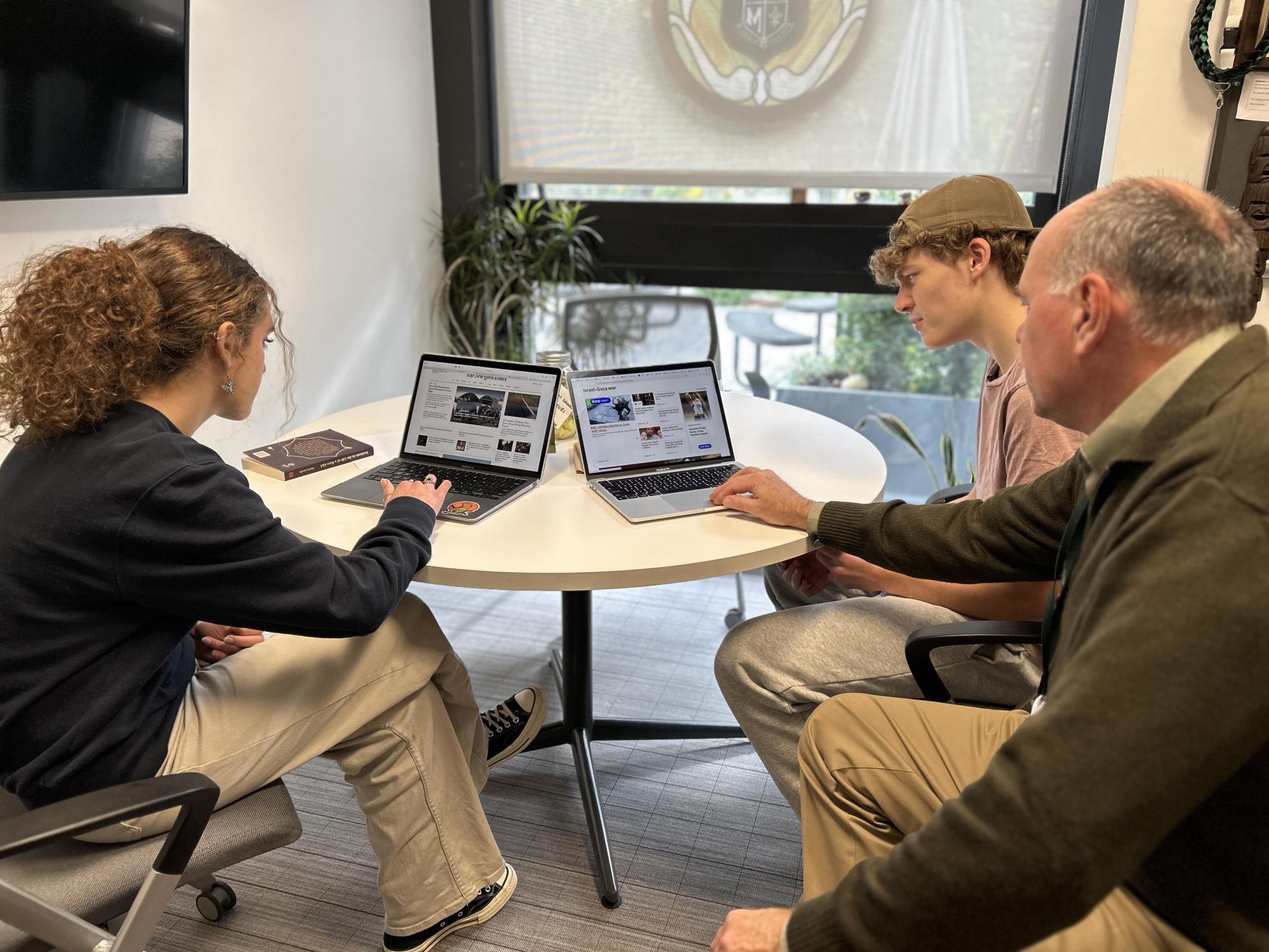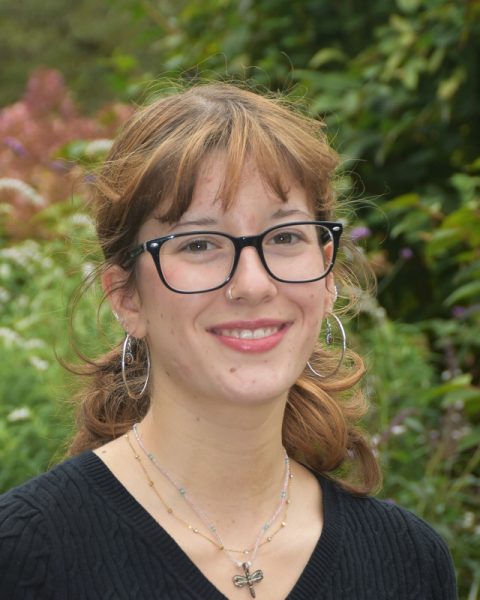As fears and tensions rise around the Israel-Hamas conflict, adults and students alike are highlighting the importance of accountable online news sourcing, informative discussions, and showing support for community members.
Fostering a Supportive and Caring Environment
“As we end a week filled with deep sadness and confusion, I feel thankful to see members of our community turn to one another for support,” Head of School Judith Guild wrote in the School’s Oct. 14 community bulletin. “We have worked toward the goal of supporting our students, faculty, and staff as they seek to understand a world where unthinkable violence can occur.”
During an Oct. 9 assembly, Upper School Head Joshua Neudel shared his observations about the prevalent use of social media among students to gather news.
He acknowledged the popularity of videos, memes, and photos related to the Israel-Palestine conflict circulating on these platforms. Neudel emphasized the importance of seeking information from credible news outlets before forming opinions or making statements about the issue.
He also called for communal support to those in need, emphasizing School values of respect and kindness now, more than ever.
Library Program Director Elyse Seltzer, who is Jewish, appreciates the School’s support during these difficult times, especially in providing affinity spaces for both students and adults.
“Even though not many people went to them, I think that having affinity spaces can be very helpful,” Seltzer said. “As an adult, I really appreciated having the space to be an affinity,” Seltzer said.
Global Studies Director Kelly Neely also emphasizes the importance of continued empathy and support.
“Right now I’m focusing on what Mr. Neudel was saying the other day about really focusing on just being supportive and caring to people— regardless of how you feel about the topic,” Neely said.
Neely has created resource guides for educators to foster informed classroom discussions and educate students about the conflict.
Accountable News Sourcing
Neudel highlights the importance of scrutinizing news sources, particularly on social media, to mitigate the spread of disinformation and misinformation.
However, he acknowledges that this isn’t an easy endeavor, as major news outlets offer different and conflicting reports of the ongoing crisis.
“How are [news sources] telling the story differently and how do we even make sense of that?,” Neudel said.
For instance, there are conflicting reports surrounding the Oct. 17 explosion at the Al-Ahli hospital in Gaza City, where hundreds are feared dead.
Palestinian officials and Gaza’s health ministry, controlled by Hamas, have attributed the responsibility for the deadly blast to Israel. However, the office of Israeli Prime Minister Benjamin Netanyahu has denied these accusations, stating that Israel is ‘not responsible’ for the incident.
Adding to the confusion, there has been a rise in viral disinformation muddying efforts to uncover the truth behind the tragedy. Media organizations and researchers are actively investigating what happened at the al-Ahli Arab Hospital. Forensic analysis of images and videos is being used to ascertain the cause of the explosion.
While the investigations are ongoing, the situation remains unclear with no definitive evidence pointing toward the party responsible for the incident.
The School refuses to allow any kind of hate speech, Neudel said, no matter who it is directed toward.
“I think we have to address antisemitic speech in the same way we address any other type of language that attacks somebody’s identity,” Neudel said.
Seltzer notes that some individuals may inadvertently perpetuate antisemitic remarks or beliefs, not out of malice, but due to a lack of awareness or understanding about what constitutes offensive content.
“But I think there are people who don’t even know that what they’re saying is antisemitic because it’s so much a part of the general media and what they’re hearing,” Seltzer said. “There are some times when people say things that are antisemitic or racist and it’s just, unfortunately, a part of our society’s lexicon.”
Especially when definitive answers cannot be found, Neudel also underscores the importance of delving deeper into sources rather than merely skimming quick headlines. This is crucial, he said, because many online platforms can exhibit bias, which might not be immediately evident in brief summaries or headlines alone.
Bharath Palanisamy ‘24 gets most of his news from social media. However, most of the content on his feed is reposts of other news sources like CNN or Al Jazeera.
“I prefer to get my news from social media because if you look at a news source like The New York Times or BBC, you only get one perspective,” Palanisamy said. “But on social media, I can see a lot of different news sources with different perspectives.”
Director of Global Studies Kelly Neely acknowledges that social media can play a valuable role in keeping the public informed with its real-time updates and diverse sources. However, she cautions that it can become significantly harmful if students depend exclusively on these platforms for their news.
“Social media is not the place to be getting information about this,” Neely said.
She attributes this to deliberate misinformation spread by some content creators and the widespread use of graphic imagery that may be traumatic for viewers.
Neely finds her news through NPR, The New York Times, The Washington Post, and the Boston Globe.
Seltzer also does not rely on social media for accurate news or information. She teaches many lessons in middle school regarding how to know if a source is valid or not.
“My first step is authority: who is saying it and how do they know what they’re talking about?” Seltzer said.
Regarding news media bias, Seltzer uses a website called AllSides, and factcheck.org to determine the validity of different claims made on various social media platforms.
“As a school, we try to work with students on media literacy and share out resources that they can use to find good news and think about the type of information they’re getting,” Neely said. “However, I’m also aware of the fact that most students don’t do that. A lot of students are learning about things on TikTok.”
On the contrary, Brooks Neufeld ’26 does not consume any of his news from social media, due to a disdain for the platform in general. He likes to follow current events by looking at CNN, The New York Times, or Apple News.
“I personally don’t use social media platforms in general. I feel like they are ways to lose time,” Neufeld said.
Palanisamy has expressed frustration over the limited resources available to students. While he recognizes that social media may have inaccuracies, he also points out that even reputed news sources are not always reliable.
“I think that it’s bad to discredit the sources that people find online because, mainly, [Neudel] didn’t give any alternatives to social media, but also because even if you’re on an actual news source that doesn’t mean the source is credible,” Palanisamy said.
Neudel concurs that even historical sources can be contentious, as historians often disagree on the conflict’s origin.
“History is often taught through a certain perspective,” Neudel said.
However, Palanisamy recognizes that this perspective is often the only lens through which many students learn about the conflict.
“I think that many people only have a very surface-level understanding, or the understanding that they have is very skewed towards a certain perspective,” Palanisamy said. “I feel like there should be a specific few people who are knowledgeable about the conflict on campus who people can talk to if they have questions about it.”
He expressed a desire for a more complex examination of the conflict within the academic framework.
“I also think classes, like history classes in particular, or International Relations and Current Events should spend more time talking about the conflict because the conflict ties into the curriculum of past history and regarding the future,” Palanisamy said.
Neely recognizes the importance of expanding perspective, which she does by letting students lead the way during discussions and encouraging them to ask questions about anything they see online.
Tackling Challenging Discussions Inside and Outside the Classroom
“As young people, you’re trying to figure out your perspectives and ideas, so you talk them out. But [it’s essential] to be aware that just because you read one or things doesn’t make you an expert on something that’s really complicated,” Neudel said.
Palanisamy concurs with Neudel that open discussions currently are not beneficial for the community’s well-being.
“Talking about the conflict in unmoderated form can be harmful because the tensions are pretty high and it could lead to something hostile,” Palanisamy said.
However, he believes that a moderated in-class discussion might be a good way for them to share different opinions. As a result, he believes that students will be able to understand more about the conflict.
“I was pretty shocked that, when we had school after the conflict first happened, a lot of people didn’t even know very basic information about it,” Palanisamy said. “And I feel that people still don’t know a lot of information about it, so I think discussions are a very good way to make sure that people know what’s actually happening.”
During a class discussion, Neely was surprised to find that many students had a limited understanding of the Israel-Palestine war as a whole, but mainly the history of it.
Seltzer also points to the fact that while teachers have been provided with more background information and resources, students are fully capable of discussing the topic in a civilized manner.
“I think when it comes to topics like this, it’s best to let the students lead based on where they’re at and what they need,” Seltzer said. “I think it is helpful to have discussions with people who might have some background knowledge and help it be a healthy discussion.”
Neufeld agrees that discussions with a teacher present are essential, and urges students to continue to be thoughtful and respectful outside of classroom discussions.
“I think it is good to have those conversations because it is one way we learn about it, but I think that we need to be sensitive about the topic,” Neufeld said. “Sometimes when we’re talking outside the classroom environment and just chatting with friends, you might be more likely to say something that could bother someone.”
He also feels that these discussions actively help him, and other students, stay focused.
Neely explained that she has not held discussions with some of her other sections because she is concerned about the emotional impact it might have on students.
“I know for a fact that it is triggering for some students and I don’t want to bring it up in a way that’s going to make people feel like they can’t escape it,” Neely said.
“I am well aware of the fact that it is such a sensitive topic and I don’t want to step in it [the discussion] and say something that, to me, might not be offensive, but perhaps somebody else who has a more personal connection to it might get upset about it.”
Neely emphasizes the need for educators to be mindful of the potential impact their words and actions may have on students who may have personal connections to the conflict.
She and other faculty members recognize the immense sensitivity and emotional weight of the Israel-Hamas War but maintain their commitment to demonstrate unwavering support for students and faculty alike.




